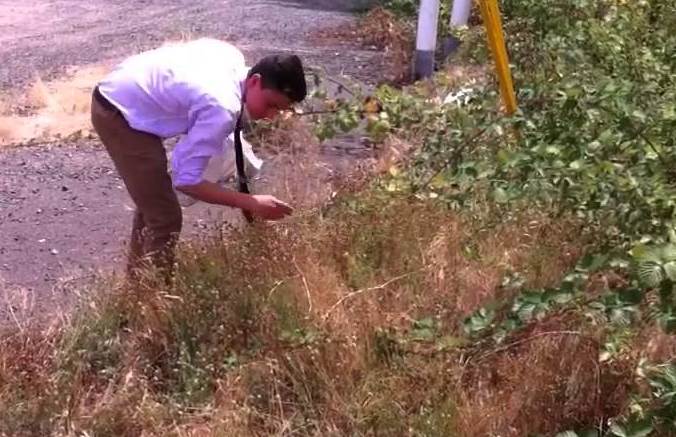
by Sam Becker, Guest Blogger
During my sophomore year I adopted a 2.4-mile stretch of the Bear Creek Greenway, a pedestrian/bike path, which runs along a river that flows through the valley. I strongly believe that I have a social responsibility to make my community a more sustainable and inviting place for every organism to live in. The service I have done, and continue to do, includes picking up litter, weeding, and rescuing trees from the clutches of blackberries.
As I began to spend more time on the Greenway, I started to do research on riparian zone restoration, the use of native plants to combat the growth of invasive species, and the effects of litter on the environment. I felt that learning about these subjects provided me with an interdisciplinary understanding of the service I had been doing, and that others could benefit from this type of meaningful and informative service. So, I decided to open this opportunity to my fellow classmates. The “Greenway Club” was proliferated near the end of my sophomore year. To date, I have logged over 100 hours of service and we have collected over 350 pounds of trash.

I continuously noticed that polystyrene foam (PSF) food containers, which are commonly known as Styrofoam, detract from the beauty of the Greenway, waterways, public parks, and roads more than any other litter. When I pick it up, it can crumble into small pieces that go everywhere and are then blown away by the wind. Upon comprehensively researching PSF, I discovered that it has a wide array of adverse effects on our health, our environment, wildlife, and Oregon’s economy. Due to all of these reasons, ten months ago, I decided to spearhead an initiative in Medford, Oregon to ban PSF food containers.
The first six months I spent hours filling out paperwork, waiting, meeting with members of the community and politicians from local and state levels, constructing an ordinance, talking with city officials from other cities, creating a committee called ECOS (the Environmental Committee to Outlaw Styrofoam), registering that committee as a business with the state of Oregon, aligning my committee under the fiscal umbrella of a nonprofit organization, and pouring in countless hours of research. After six months of waiting, I got the go ahead to petition.
In the past three months, I have spent an average of 24 hours a week for four months collecting signatures, planning, and contacting people. Realizing that this was another great way to engage my fellow classmates and the greater community in interdisciplinary learning and environmental sustainability, I invited people to help me gather signatures. Without their help and the support of my family, I would not be at the place I am at today.
The requirement to get this initiative on the ballot is 3,218 signatures, and I gathered over 4,500 signatures. Some of them were discounted for numerous reasons, but ultimately I gathered enough to qualify it as a measure on the May ballot. However, there was a chance that the City Council would pass the initiative by itself in January, which would be optimal for me because I would not have to secure funds for political advertisements, and ask people to help me more. Therefore, I met with all of the council members, the mayor, the head of the Chamber of Commerce, Medford’s recycling coordinator, and the head of the local water reclamation facility. In those meetings, I gathered information about what their respective recommendations and concerns were. Then, I surveyed sixty Medford restaurant managers or owners to see if they would support the ordinance. In total, ninety three percent supported the ordinance, even though thirty one percent were using PSF.
On January fifteenth I gave a ten-minute presentation to the Medford City Council during a public hearing. They agreed that they might pass this ordinance, but that they would like me to present at another public hearing in which all food vendors in Medford were notified. So on February fifth, I presented my information to the City Council for the last time. After I presented, there were eight owners who spoke in favor and two owners who spoke in opposition. Ultimately, the Council unanimously passed the ordinance to ban PSF. This is the first citizen led initiative in Medford, a town of 80,000 people, since 2000, and the first successful citizen led initiative since in many more years.
I have noticed that everyone who has helped out with my initiative, myself included, has developed a new respect for those in the community who strive to create solutions to the many anthropogenic calamities that the world is currently facing. By taking the action to make change, rather than complaining about what should or should not happen, we have proven to ourselves, and the community, that any individual or group can facilitate change with a hard work ethic and plenty of passion.

 '
'
